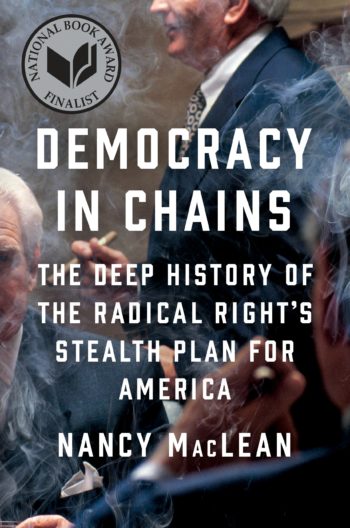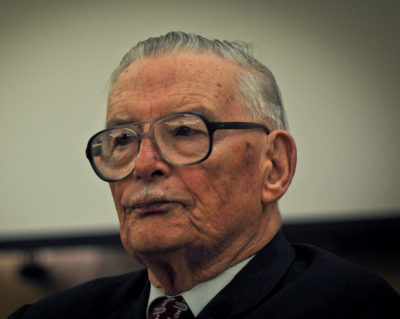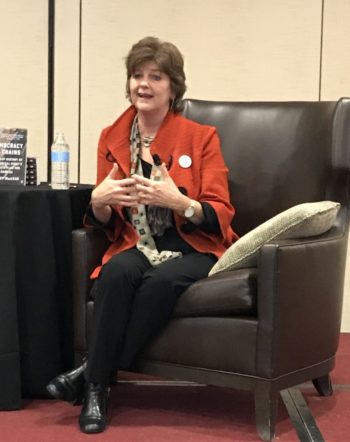Nancy MacLean is an American historian and the William H. Chafe Professor of History and Public Policy at Duke University, where she teaches courses on modern U.S. history and the history of social movements. NEA Today caught up with MacLean for an in-depth conversation of her recent book Democracy in Chains, in which she details the decades-long effort of the radical right-wing to undermine U.S. democracy by establishing footholds in government, think tanks, media, the courts, and academia. The privatization of public education is a priority of this "stealth" campaign. In the book, MacLean introduces the reader to an important but overlooked player.
While many of us are familiar with Charles and David Koch—the Koch brothers—you introduce us to a new figure: James Buchanan, who would go on to win the Nobel Prize in Economics in 1986. Who was he and how did you discover him?
Nancy MacLean: James McGill Buchanan supplied the ideas that the Koch network has weaponized to achieve an agenda they know the people do not want: what amounts to a stealth plan to change our country.
I came across him when researching the State of Virginia’s fight against the Supreme Court’s 1954 Brown v. Board of Education decision. This “massive resistance” mandated tax-funded vouchers for private schools and also the closure of any public school that planned to desegregate. Even after the forced closures left 10,000 white children school-less throughout the fall of 1958 and the courts ruled them unconstitutional, Buchanan wanted to keep the fight going. He urged, in essence, the privatization of public schools, which would have put them beyond reach of the courts.
Why, I wondered, would a believer in freeing markets with a Ph.D. from the University of Chicago, be allying, in effect, with the most arch segregationists? I learned that the contest over Brown v. Board shaped Buchanan’s career. He arrived in Virginia in 1956, just as its conservative leaders were goading southern states to fight the ruling. Like them, he saw Brown not through the lens of equal protection of the law for all citizens, but rather as another wave in a rising tide of unwarranted federal interference in the affairs of the states going back to the New Deal. In his view, all this violated individual liberty, private property rights, and states’ rights. Given a center to run at the University of Virginia in Charlottesville, he made it his life’s work to understand how the other side became so powerful and, then, to devise a strategy for breaking down the liberal state they had created.
Buchanan and Charles Koch shared the same libertarian political views and espoused the same vision of what the United States should look like—specifically when it came to economic liberty. What defines the economic liberty worldview of Buchanan and Koch? Why should their views make the rest of us so nervous?
NM: Those who subscribe to this philosophy believe that government should have only three roles: to provide for the national defense, ensure the rule of law, and guarantee social order (in short: armies, courts, and police).
Anything that impinges on the liberty of the propertied is suspect in their view, whether taxation for public schools or regulation of corporations—even to address a problem as urgent as climate change.
 Only a tiny minority of Americans holds these extreme beliefs (polls find 2-4 percent at most) but because we have allowed such vast wealth to concentrate in the hands of the top one percent, Charles Koch and his fellow donors are able to drive changes they never would be able to without the vast infrastructure of organizations they can fund.
Only a tiny minority of Americans holds these extreme beliefs (polls find 2-4 percent at most) but because we have allowed such vast wealth to concentrate in the hands of the top one percent, Charles Koch and his fellow donors are able to drive changes they never would be able to without the vast infrastructure of organizations they can fund.
This infrastructure is huge. It includes dozens of ostensibly separate national bodies such as the Cato Institute, the Heritage Foundation, the American Legislative Exchange Council, and the Federalist Society; over 150 state-level organizations whose work is aligned through the State Policy Network; organizing enterprises including Americans for Prosperity, Concerned Veterans for America, the LIBRE Initiative, and Generation Opportunity; and university-based centers of allied faculty—with George Mason University’s Mercatus Center as the best-funded flagship, but many more developing.
Some 400 colleges and universities are now getting money from the Charles Koch Foundation. There’s a great organization called UnKoch My Campus that is fighting this corruption of academic integrity, together with faculty, student, and community allies. NEA members should be aware of them as allies, because the Koch network recently announced that transforming K-12 education will be a top priority going forward. No doubt they will use their university centers to push for privatization.
There are a few issues that particularly raise the ire of libertarians, including public education and unions. Why do they disdain public education so much? Why was breaking the power of unions a central element of libertarians’ playbook?
NM: In fact, the first thing that brought Koch and Buchanan together, half a century ago, was their shared hostility toward public education—because it was public. The term libertarians use is “government schools.”
In their new order, parents will have to pay out of pocket the cost of their children’s schooling just as they pay for their food and shelter. That’s what the insiders mean by “personal responsibility.” And by attacking teachers’ unions and directing tax monies toward for-profit companies, they get closer to that goal without having to spell it out to the voters. They shift power away from the public and toward corporations that will then lobby to preserve their new sources of profit.
 James Buchanan in 2010 (photo: Atlas Network)
James Buchanan in 2010 (photo: Atlas Network)
Buchanan grew up in rural Tennessee, attended public schools and went to a local teachers’ college. Why did he have such animus towards public goods and America’s existing social contract when he was a direct beneficiary of them?
NM: I I think the answer lies in the right-wing populism Buchanan imbibed as a young white man in a bitter and propertied family. He came to identify with corporations as “producers” and view claimants on government assistance as “parasites” (the root of today’s “makers and takers” talk). This toxic way of seeing came from southern white elites who had to turn ordinary whites against their black fellow citizens to win, and it prepared him to perceive later experiences in patterned ways.
In Buchanan’s own telling, he had a formative experience in the Navy in World War II when he watched Northeasterners from Ivy League schools be promoted while he was passed over because he came from the South and attended Middle Tennessee State Teachers’ college. He knew he was as smart, if not smarter, than they, but believed he was seen as one of “the great unwashed,” in the words of this proud “country boy.”
I suspect that’s why the Brown ruling so upset him and changed the course of his life’s work. He saw the same kind of Northerners he disliked from that military experience now telling southern states what to do. Not just that, but imposing rulings that required communities to spend money on improvements that taxpayers like himself would have to pay for, whether they wanted to or not. He had no children himself and resented those who expected others to pay for teaching theirs.
We forget today how much southern segregationists argued in terms of tax burdens. Just like today’s defenders of local financing, they said why should blacks enjoy the same quality of schooling as whites if they weren’t paying the same amount in taxes? Never, of course, admitting the impossible vicious cycle they kept in place, where poor schooling meant poor job prospects and inability to pay higher taxes.
What role did Buchanan play in furthering Charles Koch’s goals?
NM: Koch was a CEO who in the late 1960s began to devour political-economic theory based on the notion that free-reign capitalism (what others might call Dickensian capitalism) would justly reward the smart and hardworking, and rightly punish those who failed to take responsibility for themselves or had lesser ability. It’s a kind of economic Social Darwinism. He believed then and believes now that the market is the wisest and fairest form of governance.
But before long Koch came to realize that if the majority of Americans ever truly understood the full implications of his vision, they would never support it. Indeed, they would actively oppose it.
We have to always remember that the architects of this plan are doing what they’re doing in the stealth manner they are because they are afraid of the majority, of the people getting wise to what they’re up to and stopping them."
So, Koch went in search of an operational strategy—what he called a “technology” —that could get around this big hurdle. He funded hundreds of thinkers until he discovered that technology in Buchanan’s thought. From Buchanan, Koch learned that for the agenda to succeed, it had to be put in place in small incremental steps, mutually reinforcing changes of the rules that govern our nation.
Koch’s team used Buchanan’s ideas to devise a roadmap for a radical transformation that could be carried out largely below the radar of the people, yet legally. The plan was (and is) to act on so many fronts at once, in what insiders call a “big bang” of “interrelated plays,” that others outside the movement would not realize the quiet revolution underway until it was too late to undo it. Examples include what we have seen in the 30 states now dominated by Republican elected officials who have been bent to the will of the Koch donor network: a battery of new laws to undermine unions, suppress the votes of those most likely to support active government, apply unprecedented gerrymandering to misrepresent the will of the remaining voters, undermine other strong liberal lobbies such as Planned Parenthood, use privatization to alter power relations, alter the state courts, and more.
How do believers in a democracy for and by the people respond to a billionaire funded movement?
NM: We have to always remember that the architects of this plan are doing what they’re doing in the stealth manner they are because they are afraid of the majority, of the people getting wise to what they’re up to and stopping them. And I am seeing signs of that happening.
 Nancy MacLean, author of "Democracy in Chains: The Deep History of the Radical Right's Stealth Plan for America."
Nancy MacLean, author of "Democracy in Chains: The Deep History of the Radical Right's Stealth Plan for America."
All over the country, I’m seeing a deepening awareness that we are at a pivotal moment, an all-hands-on-deck emergency for the future of government of, by and for the people. I’ve been impressed by the passion out there to protect democracy—and renew it to meet today’s needs. That awareness crosses sectors, from union members to environmentalists, from feminists to civil-rights activists, from good government groups to senior citizens who worked hard to build a fairer world and don’t want to see it ruined for their grandchildren.
You can see it in the Red for Ed teachers’ mobilizations and the recent strikes to defend public education, in Black Lives Matter, in the Women’s March, in the thousands of Indivisible groups built since 2016, among the Parkland students and their March for Our Lives organizing. This spring, I am working as an Innovation Fellow with PolicyLink to help think through how to stop the Koch juggernaut and fix the chronic problems of our democracy that enabled it to get this far so that we can finally achieve racial and economic equity and environmental and social sustainability.
You mention that “sunlight is said to be the best of disinfectants.” In the world that we live in—one of “fake news” and extreme partisan polarization—does shedding light on these radical right activists’ actions matter? What actions should we take to stop them from taking over our democracy?
NM: It absolutely matters. It’s vital to inform and engage as many people as we can.
But for greatest impact, the work should be done as organizers would do it, working outward in concentric circles, starting with those most likely to get the need and become engaged. There’s no point now in trying to persuade those who are trapped in the right’s bubble of deliberate misinformation.
Instead, each of us can inventory those we know through our unions, schools, friendship networks, faith congregations, and community organizations and talk with those most likely to become active, maybe even get them in reading groups to discuss what’s happening and what seems most important to work on where they are, with their particular talents and passions and resources. When widening circles engage, the right’s unity will start to crack.
But again, the first step is becoming informed. And when people do, they will realize the right amassed its power through state-level work, so that’s an excellent place to start rebuilding collective power, launching popular education efforts, and working for democracy reforms.
The publication of "Democracy in Chains" has led to criticism from the right. What kind of response/reaction have you received while on tour (negative and positive)?
NM: The right attacked the book (and me) fiercely. I talked about it here, if readers are interested: https://www.chronicle.com/article/Nancy-MacLean-Responds-to-Her/240699 . In the end, though, the critics discredited themselves. Researchers at Greenpeace and UnKoch My Campus produced a media tracker of all the hostile coverage. After checking IRS 990 forms, they revealed that 92 of 101 critical pieces about the book came from Koch-funded faculty or operatives who failed to disclose that financial relationship, a plain violation of Ethics 101.
And in any case, the libertarian attackers were overwhelmingly outnumbered by honest reviewers and readers who found the book illuminating and empowering, as the balance of the published reviews and Amazon comments illustrate. It was also gratifying that the book won the major awards it did, including being a National Book Award Finalist, after the Koch grantees piled on, which means that the juries recognized the smog machine for what it was.





